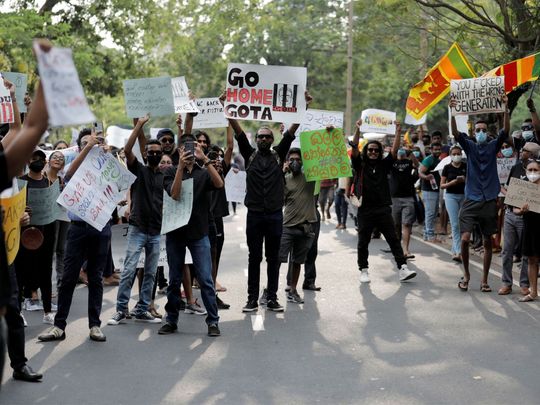
Colombo: Sri Lanka's Finance Minister, Ali Sabry, resigned on Tuesday a day after being sworn in, amid growing public unrest over a worsening economic crisis.
"I hereby tender my resignation from the post of Minister of Finance with immediate effect," Sabry said in a letter to the president.
"Whilst I regret the inconvenience caused, I believe I have always acted in the best interests of the country," a statement from Sabry said, adding that "fresh and proactive and unconventional steps" were needed to solve the country's problems.
President Gotabaya Rajapaksa appointed Sabry on Monday after dissolving his cabinet and dropping his brother, Basil Rajapaksa, who previously served as finance minister.
Ali Sabry would have been part of a team to oversee the nation's debt recast - key to obtaining support from the International Monetary Fund. No official reasons were immediately given for his resignation.
His departure is in keeping with the trend of government officials and politicians distancing themselves from the powerful Rajapaksa family in the face of growing public anger over a surge in inflation that is now Asia's fastest.
Eleven parties within the ruling coalition said in parliament on Tuesday that they would function as independent lawmakers, bringing the total to 30 members. Another 12 lawmakers from Rajapaksa's SLPP party will also distance themselves from the government, putting a simple majority in the 225-seat legislature for the president's coalition in doubt.
Opposition groups earlier rejected overtures from the president to join an interim government after the entire cabinet resigned following street protests by citizens. They want to see a change to the country's constitution that will limit Rajapaksa's wide-ranging executive powers, which include calling for elections mid-way through a five-year parliament term and appointing and firing government officials and judges.
"The time has come to change the executive presidency. Let us use this opportunity," Sajith Premadasa, leader of the main opposition Samagi Jana Balawegaya party, said in parliament. "We won't participate in musical chairs. We will come with the blessings of the people, not for power and privileges."
Maithripala Sirisena of the SLFP, a former coalition component party, said that the 20th amendment to the constitution that gave Rajapaksa's presidency sweeping powers needed to be abolished to restore democracy, adding that there was a "socio-economic and political crisis" in Sri Lanka.
Rajapaksa has shown no sign that he will step down from the presidency. The Daily Mirror reported that the president told senior party members that he was willing to hand over the government to whichever party or group that can cobble together a simple majority of 113 seats. Rajapaksa's own SLPP party is counting on retaining his brother Mahinda as prime minister.
If the government doesn't show the numbers, a proposal will be made for the parliament speaker to call for a debate on who should be the new prime minister, the newspaper said, without saying where it got the information from. There's concern among the opposition leaders that the Rajapaksa family will interfere with plans to resolve the economic crisis.
Markets reflected the economic and political uncertainties with Sri Lanka's 5.875% dollar bond maturing July falling about 2% to trade at 59 cents on the dollar, while the rupee declined 0.7% to 299 per dollar, extending its run as the world's worst performer this year.
"The situation in Sri Lanka has become very challenging and the unease investors feel about the potential outcomes is reflected in the bond prices," said Christopher Langner, head of investment strategy at First Abu Dhabi Bank in Dubai. "The extraordinary measures the country has been taking, from capital to import controls, over the past year suggest this was simmering and is now reaching a climax."
Rajapaksa is hard-pressed to resolve an economic crisis that now impacts every element of life in the country. The interim cabinet just has three other ministers, including Foreign Minister G.L. Pieris. Central bank Governor Ajith Nivard Cabraal, who had opposed aid from the multilateral lender, resigned Monday and P. Nandalal Weerasinghe, a central bank official formerly in charge of foreign-exchange management, will replace him from April 7.












